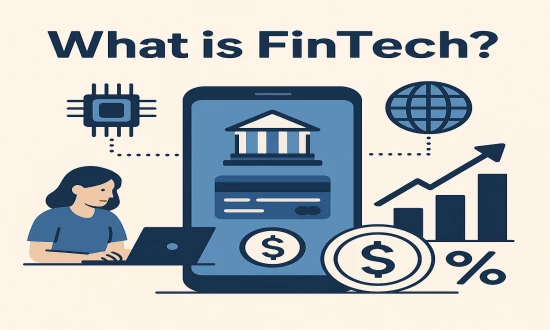Why FinTech Matters
FinTech has revolutionized the financial sector by:
- Making financial services easier and faster
Mobile banking and digital payments make transactions instant and convenient.
- Increasing financial inclusion
People without access to traditional banks can use mobile wallets and digital accounts.
- Reducing costs
Automation and digital processes cut the cost of financial operations.
- Driving innovation
From AI-driven credit scoring to blockchain-based security, FinTech introduces solutions that didn’t exist before.
Main Sectors of FinTech
- Digital Payments & Wallets
Mobile wallets like Apple Pay, Google Pay, PayPal, and local options like Vodafone Cash make paying and transferring money instant.
- Digital Banking (Neo Banks)
Banks that operate entirely online without physical branches—offering low fees, fast onboarding, and mobile-first services.
- Lending & Credit Platforms
AI analyzes user data to offer quick loans without lengthy bank processes.
Examples: peer-to-peer lending, microloans, BNPL (“Buy Now, Pay Later”).
- InsurTech
Insurance companies using AI, automation, and big data for faster claims, smart pricing, and flexible insurance services.
- WealthTech / Investment Platforms
Robo-advisors and trading apps that help users invest automatically based on risk profiles.
- Blockchain & Cryptocurrency
Blockchain provides secure, transparent transactions. Crypto enables digital assets and decentralized finance (DeFi).
- RegTech (Regulatory Technology)
Tools that help banks comply with regulations using automation, monitoring, and risk analysis.
Real Examples of FinTech
- PayPal, Stripe → online payments
- Revolut, N26 → digital banks
- Robinhood, eToro → digital investing
- M-Pesa → mobile money and financial inclusion
- Binance, Coinbase → crypto trading
- Klarna → Buy Now, Pay Later
Technologies Driving FinTech
FinTech relies on several advanced technologies:
- Artificial Intelligence (AI) → fraud detection, credit scoring, chatbots
- Machine Learning → risk prediction, customer insights
- Blockchain → secure, transparent transactions
- APIs → connect banking systems with apps (Open Banking)
- Big Data → understand customer behavior
- Cloud Computing → scalability and security
Benefits of FinTech
- Faster transactions
- Lower fees
- Better customer experience
- Improved security & fraud detection
- Access to financial services for everyone
- Personalized financial products
Challenges Facing FinTech
Despite rapid growth, FinTech faces real challenges:
- Cybersecurity threats
- Regulatory compliance
- Data privacy concerns
- Market volatility (especially in crypto)
- Integration with traditional banks
- Customer trust
The Future of FinTech
The next wave of FinTech will likely include:
- More AI-driven services
- Central Bank Digital Currencies (CBDCs)
- Biometric security (face, fingerprint, voice payments)
- Smarter investment automation
- Fully digital banking worldwide
- More partnerships between banks and tech companies
FinTech will continue to make financial services smarter, safer, and more accessible for billions of people.



